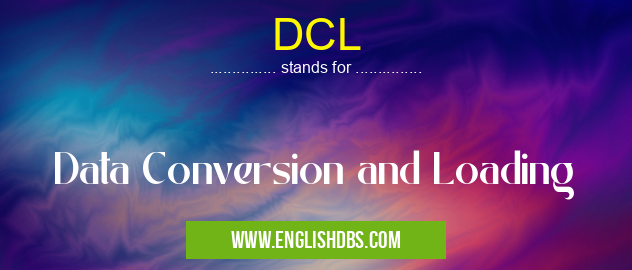What does DCL mean in UNCLASSIFIED
DCL (Data Conversion and Loading) is a critical process in data management that involves converting data from one format to another and loading it into a target system. This process is crucial for ensuring data integrity, consistency, and usability within an organization.

DCL meaning in Unclassified in Miscellaneous
DCL mostly used in an acronym Unclassified in Category Miscellaneous that means Data Conversion and Loading
Shorthand: DCL,
Full Form: Data Conversion and Loading
For more information of "Data Conversion and Loading", see the section below.
Key Points
- Purpose: DCL aims to transform raw data into a usable format that can be easily integrated into the target system. This may involve restructuring, cleansing, and standardizing the data.
- Benefits: DCL provides several benefits, including:
- Improved data quality by identifying and correcting errors and inconsistencies.
- Enhanced data usability by making it compatible with the target system's requirements.
- Increased data accessibility by centralizing data in a structured format.
- Process: The DCL process typically involves the following steps:
- Data extraction: Retrieving data from source systems.
- Data conversion: Transforming the data into the desired format.
- Data loading: Inserting the converted data into the target system.
- Tools and Technologies: Various tools and technologies are available to support the DCL process, such as:
- Data integration tools
- Data conversion software
- Data mapping tools
Essential Questions and Answers on Data Conversion and Loading in "MISCELLANEOUS»UNFILED"
What is Data Conversion and Loading (DCL)?
DCL refers to the process of converting data from one format or structure to another and subsequently loading it into a target system or database. It involves transforming raw data into a usable format that can be easily analyzed and processed.
What are the key steps involved in DCL?
DCL typically involves several key steps:
- Data Extraction: Data is extracted from various sources, such as legacy systems, files, or databases.
- Data Cleansing: The extracted data is cleaned to remove errors, inconsistencies, and duplicate records.
- Data Transformation: The data is converted into the desired format and structure for the target system.
- Data Loading: The transformed data is then loaded into the target system or database.
What are the benefits of DCL?
DCL offers several benefits, including:
- Improved data quality and accuracy
- Enhanced data accessibility and usability
- Increased efficiency and automation of data management processes
- Support for data integration and consolidation from multiple sources
- Improved decision-making based on consistent and reliable data
What tools are commonly used for DCL?
Various tools and technologies are available for DCL, including:
- Data Integration Tools: Integrate data from different sources and transform it into a common format.
- ETL (Extract, Transform, Load) Tools: Automate the data extraction, transformation, and loading processes.
- Data Warehousing Tools: Store and manage large volumes of data for analysis and reporting.
- Cloud-based Data Platforms: Provide scalable and cost-effective solutions for DCL.
What are the challenges associated with DCL?
DCL can present some challenges, such as:
- Data Quality: Ensuring the accuracy and reliability of data throughout the conversion and loading process.
- Data Compatibility: Dealing with data from different sources that may have varying formats and structures.
- Performance Optimization: Optimizing the DCL process to handle large volumes of data efficiently.
- Security and Compliance: Ensuring the protection of sensitive data during the conversion and loading process.
Final Words: DCL is a vital component of data management, enabling organizations to leverage data effectively. By converting and loading data into a consistent and usable format, DCL ensures data integrity, facilitates data analysis, and supports decision-making processes.
DCL also stands for: |
|
| All stands for DCL |
